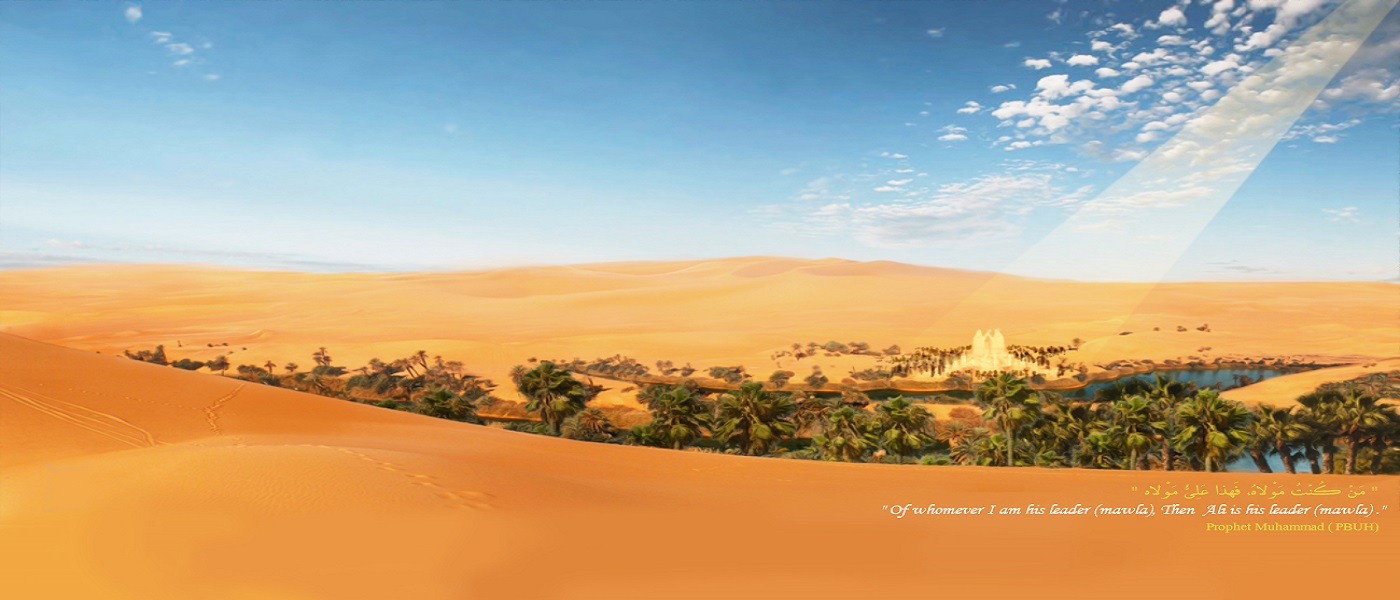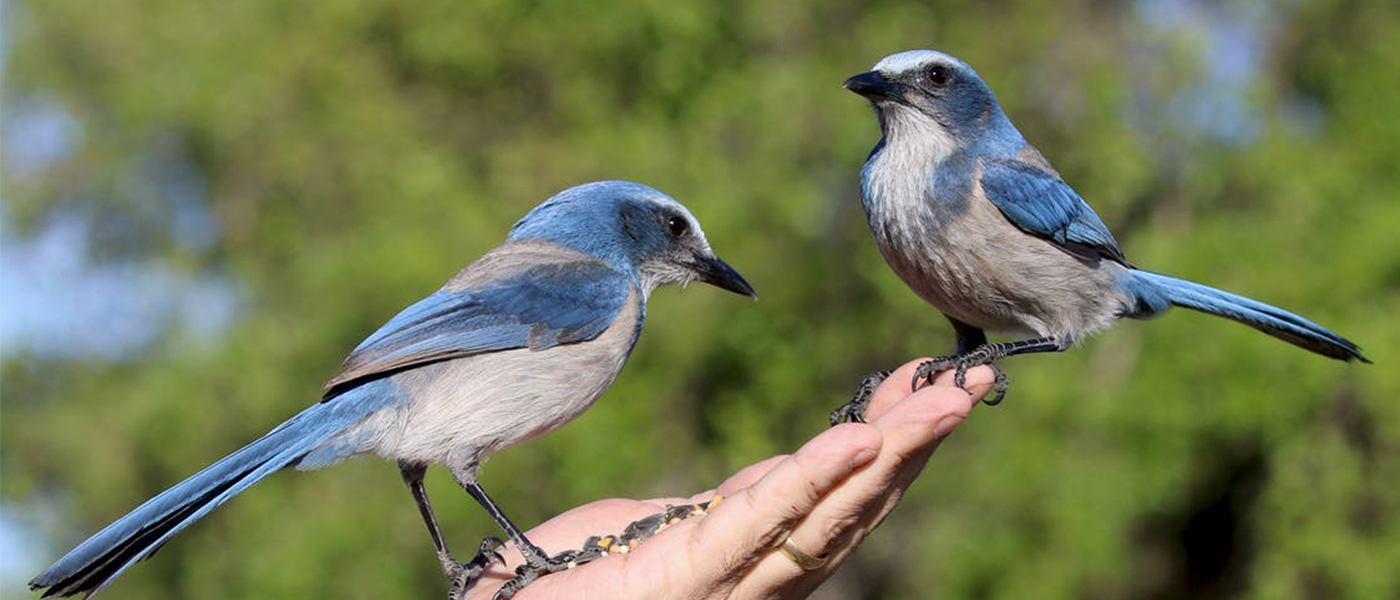

Ghadir Khum, the Great Eid of Allah
Eid al-Ghadir is one of the most important historical events celebrated by many Muslims on the 18th day of the last Islamic month, Dhu al-Hijjah. Ghadir Khum is the name of a pond near Mecca. It was a place for pilgrims, who had attended the ritual of Hajj, to greet and rest a short while before taking different routes to their homes.
The Message of Allah
After completing his last pilgrimage, which was the first Muslim’s great gathering -with more than 70 thousand people- in the presence of their leader, the Messenger of Allah, Prophet Muhammad (PBUH&HP) arrived at Ghadir Khum on the 18th of Dhu al-Hijjah where he received another revelation from God saying:
“O, Apostle! Deliver what has been sent down to you from your Lord, and if you do not, you will not have delivered His message, and Allah shall protect you from the people. Indeed Allah does not guide the faithless lot” (5:67)
Allah in this verse commanded the Prophet (PBUH&HP) to clarify what had been previously revealed regarding Ali (AS) [i] and told him not to worry about the reaction of the people in delivering His message, for He would protect His Messenger from them.
Prophet’s Concern for the Future of Muslims
Upon receiving the above verse, the caravan stopped in the valley of Ghadir at Prophet’s command. According to some sources, about 12,000 people from Yemen had come to attend that year’s Hajj, which was known as “The farewell pilgrimage” (Hajj-at-Alvida). Despite the different route that they had to take to their homes, they were asked by prophet Muhammad (PBUH&HP) to choose the way which passed the place of Ghadir, so that they could be present at the time when the incident of Ghadir was taking place.
Then he sent for all people who had gone ahead to return and waited for those who had fallen behind to arrive and gather. At noon that day, the Prophet (PBUH&HP) performed the prayer in congregation with a great population of people behind him. When the prayer was finished, Prophet Muhammad (PBUH&HP) ascended the pulpit his followers had set up from the camel saddles and gave his famous sermon in a loud voice. He started his speech by praising Allah, announced the heart-breaking news of his oncoming death and then stated:
“Verily, I am leaving behind two precious things (thaqalayn) among you: The Book of God (Quran) and my kindred (itrah), my household (Ahl al Bayt), for indeed, the two will never separate until they come back to me by the Pond (of al Kawthar on the Judgement's Day)” [1].
The Prophet’s Authority over all Muslims
The Prophet (PBUH&HP), in an attempt to remind Muslims of his own authority over them, asked: “Who has more of a right over the believers than their own selves?” Everyone present proclaimed: “Allah and His Prophet know better.”
The Prophet (PBUH&HP) then said: “Allah is my master and I am the master of all the believers, and I have more right and authority over the believers than they have over their own selves.”
Imam Ali (AS), the Divinely Appointed Successor of the Prophet (PBUH&HP)
Thereupon, he took Imam Ali (AS)’s hand, raised it up and continued:
“Whomsoever I am his leader (Mawla), Ali (AS) is also his leader (Mawla). O’ Allah! Love those who love him (Ali (AS)) and oppose those who oppose him” [2].
The Angel of Revelation, Gabriel, once again descended by the order of Allah and revealed the following verse of the Quran:
“Today I have perfected your religion for you, and I have completed My blessing upon you, and I have approved Islam as your religion” (5:3).
Ghadir, The day of Congratulations and Happiness
This day has been marked in history as a Grand Eid for many Muslims since then. It is also known as the Day of Leadership (Imamate) and Mastership (Wilayat), which is among the critical beliefs of Islam and the axioms of this holy religion.
A large number of Muslims around the world hold special celebrations, congratulate one another on this day and say:
“All praise belongs to Allah who has made us amongst those who hold firm to the Mastership (Wilayat) of the Commander of the Faithful (Amir al-Muminin) -Ali ibn Abi Talib (AS)- and the Imams” [3].
Notes:
[i] According to the narration of Yawm al-Dar (The Day of invitation to his Home), the Prophet(PBUH) was commissioned in the third year of his prophethood to declare his call to Islam openly. This is clearly stated in the Holy Quran:
وَأَنذِرْ عَشِيرَتَكَ الأَقْرَبِينَ.
“Warn the nearest of your kinsfolk” (26:214).
After this, the Prophet(PBUH), invited his close relatives to his uncle Abu Talib’s house, after having their meal, he started to say: O Children of Abd al-Muttalib. I swear to God I know of no one among the Arabs who could have brought anything better than I have brought for you. I have brought for you prosperity here and your future. God has ordered me to invite you to my religion. Who among you will assist me in being my brother, helper, and successor?
No one showed any interest except for Ali (AS) who was the youngest. He rose up, saying: “O Messenger of God. I will be your assistant in this affair.”
The Prophet (PBUH&HP) put his hand around Ali’s neck and said:
إنَّ هَذا أَخِي وَوَصِيِّي وَخَلِيفَتِي فِيكُمْ فَاسْمَعُوا لَهُ وَأَطِيعُوا.
“This brother of mine is my helper, and successor. Listen to him and obey his commands” [4].
References:
Share This Article

What Are My Responsibilities towards Animals in Islam?
Fundamental needs of animals in Islam includes their rights in Islam, and human beings have to fulfill them. The very first needs of animals which are vital to them include sufficient and proper food, water, a comfortable place to rest and live, and physical health. These and some other rights of the animals are discussed in this article.
Food for Animals in Islam
Animals are unable to talk and express their needs. Captivating the animals and inhibiting them from the blessings that God has reserved for them are unfair [1]. Every animal with either lawful (Halal) or unlawful (Haram) meat, with or without benefit to its owner, birds or cattle, should be provided with adequate food and water, otherwise should be released to seek for its requirements [2]. The animals’ rights in food provision can be listed as:
Feeding the animal adequately, otherwise, it should be released in pastures or nature to find food [3];
Paying special attention to the animal, with whether lawful [i] (Halal) or unlawful [ii] (Haram) meat, which gives milk to its baby because it requires double food supply [4]. Imam Ali (AS) ordered the alms-tax collectors nor to separate the camel from its baby neither to milk the whole milk of the camel as it might be harmful to the baby camel [5];
Not to feed the animal with unlawful food since it is detestable (Makruh) [6];
Not to leave the animal hungry. Prophet Muhammad (PBUH&HP) blamed a man who had left his camel hungry: “you should fear God!” [7];
Watering animal. Partial (Wudu) and full (Ghusl) ablution are some sorts of washing body which are obligatory for Muslims in certain conditions and are prerequisites for some religious duties. Regarding Islamic jurisprudence (Fiqh), if an animal is dying of thirst and there is not enough water to both water the animal and perform the ablution, at certain conditions, watering the animal is the priority [8]. Imam Baqir (AS) said that whoever waters a thirsty animal, God will place him at the shelter of His Throne the day that there is no protection except Him [9].
Health and Treatment of Animals in Islam
Hygiene and health of the animal are emphasized in Islam. Providing animals with healthy food and water, a clean place to live and the required treatments and medications are of the duties over their owners. Islamic jurisprudence (Fiqh) obliges the owner of the animal to pay the expenses of the treatment of the animal [10].
Rest and Peace
It is over every Muslim to consider the rest and peace of the animal. Thereby, an appropriate place should be provided for the animal. Also, a suitable time should be considered for the exploitation of the animal, especially during the night that they need to rest. Prophet Muhammad (PBUH&HP) advised to let the animals rest whenever they are utilized and ordered not to oppress them[11].
These and other Islamic advises demonstrate how much care is given to the animals in Islam. This is contrary to the modern thinking ideas that consider animals as machines to serve humans without needing any rest.
Reproduction
Human beings are not allowed to deprive animals of reproduction [12]. According to Prophet Muhammad (PBUH&HP), sterilizing the animal is equal to dismembering it [12].
Affection toward Animals in Islam
An animal raised by a human being has the right of affection over its owner. Hence, it is detestable that the owner of the animal slaughters the animal that he\she has raised [13]. This shows that Islam considers the rights due to a harmonious cohabitation for humans over each other as well as for animals over humans. Imam Sajjad (AS) made a will to bury his camel after its death so that it might not be torn apart by the wild animals [14].
Respect for the Animals in Islam
Animals trained for purposes such as companionship, detection, protection, farm work, etc. have received great care in Islamic teachings such that keeping a trained dog at home is permitted if the hygiene tips are considered [15]. It is narrated that a man who had his horse with him, saluted Prophet Muhammad (PBUH&HP). Prophet (PBUH&HP) saluted both the man and his horse in return [16].
This demonstrates the importance of keeping respect for the animals, especially those that are trained. In this regard, branding iron animal on the face (which was common in the past among some ethnic groups) is forbidden in Islam and is considered unfair [17]. Also, Prophet Muhammad (PBUH&HP) ordered not to rest while seated on the animals’ back [18].
Punishments for Ignoring the Rights of the Animals in Islam
Respecting the rights of the animals in Islam is so important that Prophet Muhammad (PBUH&HP) said that whoever ignores the rights of the animals that he\she had owned, he\she should wait in the judgment day until those animals pass over while crushing or butting him\her [19].
Notes:
[i]. e.g., cow or sheep.
[ii]. e.g., dog.
References:
- A. Javadi Amoli, “Mafatih al-hayat”, p. 675.
- Sheikh al-Tusi, “Al-Mabsoot”, vol. 6, p. 47.
- H. T. Nuri Ṭabarsi, “Mustadrak al-Wasail”, vol. 8, p. 36.
- A. Javadi Amoli, “Mafatih al-hayat”, p. 678.
- “Nahj al-Balagha”, letter 25.
- Sheikh al-Tusi, “Tahdhib al-Ahkam”, vol. 9, p. 115.
- M. B. Majlesi, “Bihar al-Anwar”, vol. 61, p. 111.
- A. Javadi Amoli, “Mafatih al-hayat”, p. 681.
- “Makarim al-Akhlaq”, p. 135.
- M. H. Najafi, “Jawahir al-Kalam”, vol. 36, p. 436-437.
- J. Suyuti, “Jami al-Sagheer”, vol. 1, p. 102.
- A. Javadi Amoli, “Mafatih al-hayat”, p. 686.
- A. Al-Barqi, “Al-Mahasin”, p. 634.
- Shaykh al-Saduq, “Thawab al-A'mal wa 'Iqab al-A'mal”, p. 50.
- Animals in Islam
- F. Rawandi, “Al-Nawader”, p. 41-42.
- Shaykh Saduq, “Al-Amali”, p. 507.
- Q. Nu'man, “Da'a'im al-Islam”, vol 1, p. 347.
- Muslim ibn al-Hajjaj, “Sahih Muslim”, vol. 3, p. 74.
Read More

Does Islam recognize Human Rights?
To address this question, we need first to clarify what we mean by ‘human rights’. Does the term refer to the so-called Universal Declaration of Human Rights, the UDHR? Or does it simply refer to the rights of humans in a general sense?
Islam and the Universal Declaration of Human Rights
To start with, Islam does indeed confirm the basic human rights mentioned in the Universal Declaration of Human Rights, the UHDR. That is to say, rights such as the right to life, freedom, equality, etc. are acknowledged by Islam. However, the way Islam looks at these concepts may be different.
That is probably the reason why the Cairo Declaration on Human Rights in Islam, the CDHR, was composed some years later. The declaration included nearly the same basic human rights mentioned in the UHDR; what distinguishes the two, however, is the special perspective of Islam on the Human Being and the subject of rights.
Islam and Human Rights
Before examining human rights from an Islamic perspective, the following points may be considered: Is the concept of human rights a ‘modern’ phenomenon? Are human societies, let’s say human authorities, to define certain rights for human beings? If so, are these established rights all-inclusive? Can they be applied to every human being regardless of time and place or any other particular circumstances?
It seems that Islam has a distinct perspective on human rights; something that has to be elaborated in more detail.
Firstly, Islam views rights as being inherent in human beings. This means that, according to Islam, God has granted humans certain rights since the very beginning of creation. There seems no need for a group of people to establish rights for human beings; whether it be the United Nations or any other international institution.
This can explain, to a great extent, any dissimilarity between Islam and the UDHR. Accordingly, there may be certain rights recognized by Islam that are not found in the United Nations Declaration of Human Rights, and equally, there may be rights stated in the UDHR that are not recognized by Islam.
Human Rights in Islamic Resources: The Quran
If we have a closer look at the Islamic traditions, we realize that not only they have addressed human individual and collective rights in some great detail, but also gone beyond our ‘modern’ definition of the rights of humans! They have introduced something much more valuable, that is, ‘human dignity’!
To begin with, the Holy Scripture of Islam, the Quran, looks upon humans as one endowed with dignity. Human beings’ dignity refers to their advantages. This means that God has endowed them with sublime traits [1].
"Certainly We have honored the Children of Adam ….. and preferred them with a complete preference over many of those We have created" (17:70).
Also, all humans are children of Adam and are created from clay. They are equal regardless of gender differences, ethnicity, color, etc.
"Indeed, We created you from a male and a female and made you nations and tribes that you may identify yourselves with one another"(49:13).
Human Rights in Islamic Resources: The Hadith (Narrations)
There are plenty of writings on the subject of rights in Islamic resources, amongst which Imam Sajjad (AS)’s The Treatise on Rights is one of the best. Imam Ali b. al-Hussain (AS), known as Sajjad (the Often in Prostration) [2], has left a comprehensive account on the issue [3]. Almost 50 rights and duties are introduced and discussed in this momentous document; it includes various social relations of any individual such as rights of parents, spouses, children, neighbors, teachers, students, believers, the leader of Congregational Prayer, the government, etc. It also defines the duties that humans have towards their ‘self’ and even their organs:
“The right of your ‘self’ (nafs) against you is that you employ it in obeying God.”
“The right of the tongue is that you consider it too noble for obscenity, accustom it to good, refrain from any meddling in which there is nothing to be gained, express kindness to the people, and speak well concerning them.” [4]
The treatise was written centuries ago, yet it addresses not only the issue of rights in an extensive manner, but also illustrates the ethical principles of citizenship in detail:
“The right of your neighbor is that you guard him when he is absent, honor him when he is present, and aid him when he is wronged… if you know of any evil from him, you conceal it…You do not forsake him in difficulty, you release him from his stumble, you forgive his sin, and you associate with him generously”.
“The right of the people of your creed is harboring safety for them, compassion toward them…you should love for them what you love for yourself and dislike for them what you dislike for yourself…” [5].
Our concise examination of the Islamic viewpoint on the subject of human rights implies that Islam does recognize human rights. Nonetheless, a particular Islamic perspective on human beings as the honored creature of God with specific rights and duties has to be taken into consideration.
References:
- "Statement on Human Rights" (PDF), Retrieved 2017,
- Islami, S. H. (2005). Retrieved 2017, from Noormags
- Javadi Amuli, ‘Abdullah. Sources Of Human Rights In Islam. Retrieved 2017, from
- ‘Life of Imam Sajjad (a.s)’. Retrieved 2017, from http://shiastudies.org/article/imam-ali-b-al-husayn-al-sajjad-beginner
- ‘Risalat al-huquq’. Retrieved 2017, from http://en.wikishia.net/view/Risalat_al-huquq_(book)
- TREATISE ON RIGHTS (RISALAT AL-HUQUQ). Retrieved 2017,
Read More

